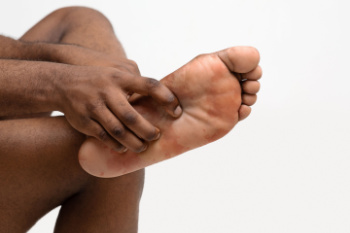
A rupture of the plantar fascia can cause sudden, sharp pain in the sole of the foot, often described as a tearing or popping sensation. The plantar fascia is a thick band of tissue that supports the arch and helps absorb the impact of walking and running. While plantar fasciitis is more common, a complete tear is rare. It typically occurs during high-impact sports or sudden movements, especially in people with tight arches or who have a history of foot strain. A plantar fascia rupture may lead to swelling, bruising, and difficulty bearing weight. Diagnosis is usually confirmed through an MRI scan, which helps determine the extent of the damage. In some cases, surgery may be needed, especially if the tissue fails to heal after conservative treatment. A podiatrist can diagnose the problem and guide recovery through wearing supportive footwear, immobilization, or surgery, if needed. If you have extreme pain on the sole of your feet, it is suggested that you promptly schedule an appointment with a podiatrist for an exam and appropriate treatment options.
Plantar fasciitis is a common foot condition that is often caused by a strain injury. If you are experiencing heel pain or symptoms of plantar fasciitis, contact one of our podiatrists from Montgomery Foot Care Specialists. our doctors can provide the care you need to keep you pain-free and on your feet.
What Is Plantar Fasciitis?
Plantar fasciitis is one of the most common causes of heel pain. The plantar fascia is a ligament that connects your heel to the front of your foot. When this ligament becomes inflamed, plantar fasciitis is the result. If you have plantar fasciitis you will have a stabbing pain that usually occurs with your first steps in the morning. As the day progresses and you walk around more, this pain will start to disappear, but it will return after long periods of standing or sitting.
What Causes Plantar Fasciitis?
- Excessive running
- Having high arches in your feet
- Other foot issues such as flat feet
- Pregnancy (due to the sudden weight gain)
- Being on your feet very often
There are some risk factors that may make you more likely to develop plantar fasciitis compared to others. The condition most commonly affects adults between the ages of 40 and 60. It also tends to affect people who are obese because the extra pounds result in extra stress being placed on the plantar fascia.
Prevention
- Take good care of your feet – Wear shoes that have good arch support and heel cushioning.
- Maintain a healthy weight
- If you are a runner, alternate running with other sports that won’t cause heel pain
There are a variety of treatment options available for plantar fasciitis along with the pain that accompanies it. Additionally, physical therapy is a very important component in the treatment process. It is important that you meet with your podiatrist to determine which treatment option is best for you.
If you have any questions, please feel free to contact our office located in Montgomery, AL . We offer the newest diagnostic and treatment technologies for all your foot care needs.

Heel pain often comes from a few common issues in the foot and heel area. One frequent cause of heel pain is plantar fasciitis, which involves micro‑tears in the fibrous band under the foot where it meets the heel bone. Heel spurs can develop as a bone growth at that same connection. Although sometimes symptomless, they can accompany ongoing plantar fascia discomfort. In active adolescent children, Sever’s disease is caused by inflammation of the growth plate at the back of the heel. It typically occurs when their activity level increases or from wearing improper footwear. Wearing tight shoes can cause a so-called pump bump on the back of the heel, which can become painful when walking. A podiatrist can evaluate these sources of heel pain with an exam and imaging tests to determine a treatment plan. If you are experiencing persistent heel pain, it is suggested that you schedule an appointment with a podiatrist for a diagnosis and appropriate treatment.
Many people suffer from bouts of heel pain. For more information, contact one of our podiatrists of Montgomery Foot Care Specialists. our doctors can provide the care you need to keep you pain-free and on your feet.
Causes of Heel Pain
Heel pain is often associated with plantar fasciitis. The plantar fascia is a band of tissues that extends along the bottom of the foot. A rip or tear in this ligament can cause inflammation of the tissue.
Achilles tendonitis is another cause of heel pain. Inflammation of the Achilles tendon will cause pain from fractures and muscle tearing. Lack of flexibility is also another symptom.
Heel spurs are another cause of pain. When the tissues of the plantar fascia undergo a great deal of stress, it can lead to ligament separation from the heel bone, causing heel spurs.
Why Might Heel Pain Occur?
- Wearing ill-fitting shoes
- Wearing non-supportive shoes
- Weight change
- Excessive running
Treatments
Heel pain should be treated as soon as possible for immediate results. Keeping your feet in a stress-free environment will help. If you suffer from Achilles tendonitis or plantar fasciitis, applying ice will reduce the swelling. Stretching before an exercise like running will help the muscles. Using all these tips will help make heel pain a condition of the past.
If you have any questions please contact our office located in Montgomery, AL . We offer the newest diagnostic and treatment technologies for all your foot and ankle needs.

Fungal toenails, or onychomycosis, are caused by fungi that infect the nail through cracks or cuts in the skin. Warm, moist environments, like sweaty shoes or public shower areas, promote fungal growth. The infection can start in one nail and spread to others, if left untreated. Symptoms include thickened, discolored nails that may appear yellow, brown, or white. The nail may become brittle, crumbly, or distorted in shape. In some cases, it may separate from the nail bed and emit a foul odor. While not always painful, fungal toenails can cause discomfort, especially when wearing shoes. A podiatrist can diagnose fungal toenails through a physical exam and may take a sample for lab testing to confirm the infection. Treatment options include topical or oral antifungal medication, and in severe cases, nail removal. If you are dealing with this condition, it is suggested that you make an appointment with a podiatrist for evaluation and treatment.
If left untreated, toenail fungus may spread to other toenails, skin, or even fingernails. If you suspect you have toenail fungus it is important to seek treatment right away. For more information about treatment, contact one of our podiatrists of Montgomery Foot Care Specialists. our doctors can provide the care you need to keep you pain-free and on your feet.
Symptoms
- Warped or oddly shaped nails
- Yellowish nails
- Loose/separated nail
- Buildup of bits and pieces of nail fragments under the nail
- Brittle, broken, thickened nail
Treatment
If self-care strategies and over-the-counter medications does not help your fungus, your podiatrist may give you a prescription drug instead. Even if you find relief from your toenail fungus symptoms, you may experience a repeat infection in the future.
Prevention
In order to prevent getting toenail fungus in the future, you should always make sure to wash your feet with soap and water. After washing, it is important to dry your feet thoroughly especially in between the toes. When trimming your toenails, be sure to trim straight across instead of in a rounded shape. It is crucial not to cover up discolored nails with nail polish because that will prevent your nail from being able to “breathe”.
In some cases, surgical procedure may be needed to remove the toenail fungus. Consult with your podiatrist about the best treatment options for your case of toenail fungus.
If you have any questions, please feel free to contact our office located in Montgomery, AL . We offer the newest diagnostic and treatment technologies for all your foot care needs.

A foot fracture can affect any of the 26 bones in the foot, including the toes, metatarsals, sesamoids near the big toe, and the rearfoot bones such as the navicular, talus, and heel bone. These foot fractures often result from twisting injuries, falls, or direct impact against a hard surface. Pain is usually immediate and worsens when placing weight on the foot. A podiatrist typically diagnoses a fracture using an X-ray to identify the location and type of break. In some cases, additional imaging may be required if the fracture is complex or not visible on standard X-rays. Treatment depends on which bone is fractured and the severity of the break. It often involves wearing a splint, cast, or a protective shoe or boot to stabilize the foot. Weight-bearing may be restricted for several weeks while the bone heals. If you have broken a bone in your foot, it is suggested that you make an immediate appointment with a podiatrist for an exam and appropriate treatment options.
A broken foot requires immediate medical attention and treatment. If you need your feet checked, contact one of our podiatrists from Montgomery Foot Care Specialists. our doctors can provide the care you need to keep you pain-free and on your feet.
Broken Foot Causes, Symptoms, and Treatment
A broken foot is caused by one of the bones in the foot typically breaking when bended, crushed, or stretched beyond its natural capabilities. Usually the location of the fracture indicates how the break occurred, whether it was through an object, fall, or any other type of injury.
Common Symptoms of Broken Feet:
- Bruising
- Pain
- Redness
- Swelling
- Blue in color
- Numbness
- Cold
- Misshapen
- Cuts
- Deformities
Those that suspect they have a broken foot shoot seek urgent medical attention where a medical professional could diagnose the severity.
Treatment for broken bones varies depending on the cause, severity and location. Some will require the use of splints, casts or crutches while others could even involve surgery to repair the broken bones. Personal care includes the use of ice and keeping the foot stabilized and elevated.
If you have any questions please feel free to contact our office located in Montgomery, AL . We offer the newest diagnostic and treatment technologies for all your foot and ankle needs.
